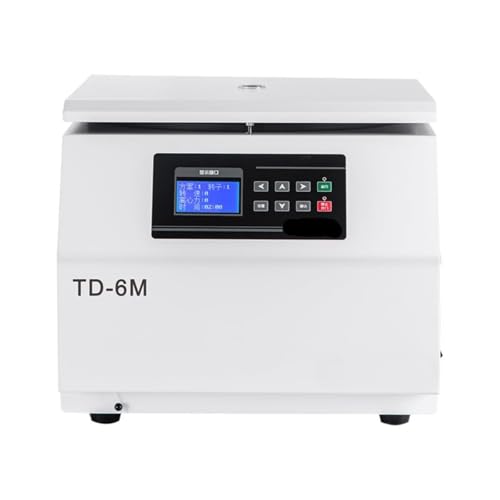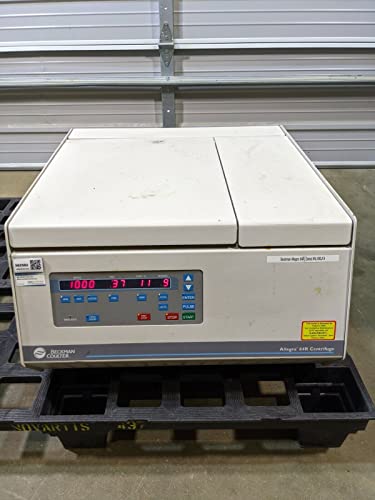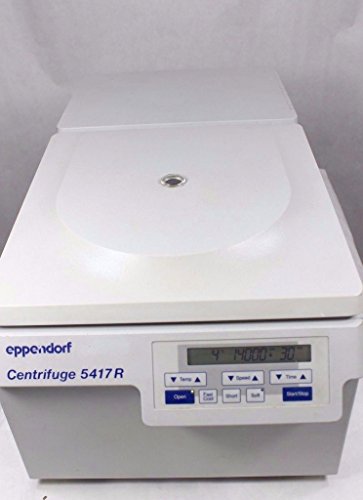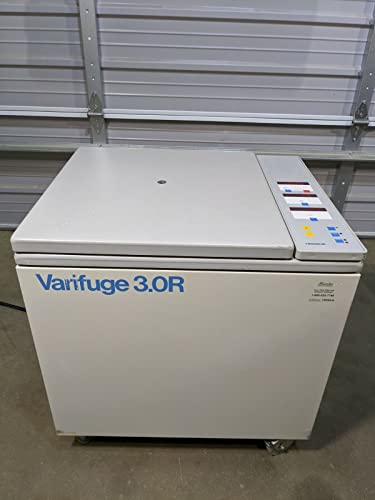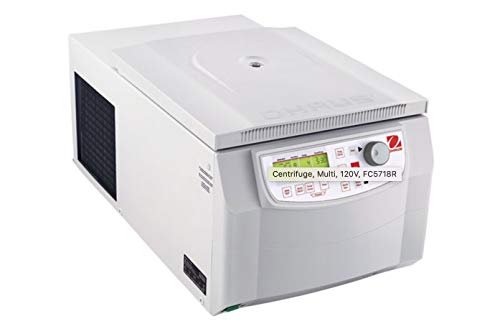As you navigate the evolving landscape of laboratory equipment, understanding the best refrigerated lab centrifuges for 2025 is vital. These advanced models not only enhance sample integrity but also streamline your research processes. With a focus on efficiency and reliability, you’ll find options that suit various applications. But which centrifuge truly stands out? Let’s explore the top contenders and what makes them indispensable for your lab work.
Eppendorf 5415R Refrigerated Centrifuge with Rotor F45-24-11
The Eppendorf 5415R Refrigerated Centrifuge with Rotor F45-24-11 is a top choice for researchers and lab technicians who need reliability and precision in their experiments. With a temperature range from 0°C to 40°C, it maintains a steady 4°C at maximum speed, reaching up to 13,200 rpm. Its compact design fits on any lab bench, while the soft-touch lid makes loading and unloading easy. You’ll appreciate the user-friendly digital display and adjustable-speed Short Spin button for quick tasks. Plus, the Fast Temp function cools the chamber to 4°C in just 16 minutes, ensuring peak performance every time.
Best For: Researchers and lab technicians seeking a reliable and precise refrigerated centrifuge for their experiments.
Pros:
- Compact design fits easily on lab benches, saving space.
- Maintains a constant 4°C temperature at maximum speed for optimal sample preservation.
- User-friendly controls with digital display and adjustable-speed options enhance ease of use.
Cons:
- Limited rotor capacity may not accommodate larger sample volumes.
- The 90-day limited warranty may be shorter compared to some competitors.
- Initial cooling time of 16 minutes may be inconvenient for urgent tasks.
Electric Lab Centrifuge 6000 RPM
For labs that require precise temperature control and efficient sample processing, the Electric Lab Centrifuge with speeds up to 6000 RPM stands out as an exceptional choice. With a maximum RCF of 5200xg, it offers a temperature control range of -20°C to 40°C, ensuring ±1°C accuracy. You’ll appreciate its 9 programmable modes and user-friendly LCD display that streamline operations. Plus, it features adjustable acceleration and deceleration levels, enhancing usability. Despite some feedback regarding speed limitations, this compact centrifuge is compliant with industry standards, low on energy consumption, and backed by a responsive technical support team.
Best For: The Electric Lab Centrifuge is best for laboratories seeking reliable and precise sample processing with advanced temperature control capabilities.
Pros:
- User-friendly LCD display for easy operation and monitoring.
- Compact design optimizes lab space while ensuring low energy consumption.
- Nine programmable modes allow for versatile applications in various laboratory settings.
Cons:
- Reported speed limitations with unbalanced rotor errors occurring above 2000 RPM.
- Lack of 50ml cent tube inserts as initially advertised may lead to user inconvenience.
- Claims of exaggerated specifications that have resulted in customer dissatisfaction.
Beckman Allegra 64R Refrigerated Centrifuge
Looking for a reliable refrigerated centrifuge that can handle temperatures as low as -20°C? The Beckman Allegra 64R, model number 367586, is your solution. This centrifuge features the S0410 rotor type and is compatible with swing bucket rotors, making it versatile for various applications. Designed by Beckman Coulter, it’s tested and proven to perform efficiently at low temperatures, ensuring your samples remain stable. Its robust design and reliability make it an essential tool in your lab. When you need dependable performance, the Beckman Allegra 64R won’t let you down. Upgrade your research capabilities with this exceptional centrifuge!
Best For: Researchers and laboratories requiring a reliable centrifuge capable of operating at low temperatures for effective sample preservation.
Pros:
- Efficient performance at temperatures as low as -20°C, ensuring sample stability.
- Versatile rotor compatibility with swing bucket rotors, suitable for various applications.
- Robust design from Beckman Coulter, known for its reliability and durability in laboratory settings.
Cons:
- Higher initial investment compared to non-refrigerated centrifuges.
- Potentially larger footprint, requiring more lab space.
- Maintenance costs may be higher due to the refrigerated component.
Centrifuge Machine, Regular Refrigerated Fixed Angle Rotor for Laboratory
Designed with a large radius rotor featuring 8 tube holes, the Regular Refrigerated Fixed Angle Rotor centrifuge stands out as an ideal choice for laboratory professionals seeking high-speed performance and efficient sample processing. Its centrifugal force is 1.5 times greater than that of an ordinary 6-hole rotor, enhancing your experiments. The clip-on rotor design makes exchanges quick and easy. You’ll appreciate the outward cover switch that opens automatically for one-handed operation and the LED display for speed and timing. Enjoy silent, stable operation with a maintenance-free motor, perfect for tasks like serum extraction and microbial sample processing.
Best For: Laboratory professionals seeking a high-speed centrifuge for efficient sample processing and separation tasks.
Pros:
- High centrifugal force (1.5 times greater than a 6-hole rotor) enhances experimental outcomes.
- User-friendly design with an automatic cover switch for easy one-handed operation.
- Silent and stable performance with a maintenance-free motor ensures longevity and safety.
Cons:
- May be more expensive compared to standard centrifuge models.
- Limited to fixed angle rotor design, which may not suit all types of sample processing needs.
- Requires regular calibration to maintain optimal performance.
Refrigerated Eppendorf 5417R Benchtop Lab Centrifuge
The Eppendorf 5417R Refrigerated Benchtop Lab Centrifuge stands out as an ideal choice for labs requiring reliable and efficient sample processing. Its compact design makes it easy to use, while offering a maximum speed of 16,400 rpm (25,000 x g) for effective pelletization. You’ll appreciate the temperature range of -9°C to 40°C, along with features like a microprocessor-controlled keyboard and a five-digit LED display. Safety is paramount, thanks to the load imbalance sensor and SOFT START/STOP function. Plus, the FAST COOL function quickly lowers the temperature to 4°C in under 20 minutes, enhancing your workflow.
Best For: Laboratories that require a compact, reliable, and efficient centrifuge for sample processing.
Pros:
- Compact design allows for easy placement and use in limited lab spaces.
- High maximum speed of 16,400 rpm ensures effective pelletization for various applications.
- Safety features like load imbalance sensors and SOFT START/STOP function protect delicate samples.
Cons:
- Limited capacity of 60 mL may not be sufficient for larger sample volumes.
- Temperature range may not meet the needs of all specialized applications requiring extreme cooling.
- Price point may be higher compared to non-refrigerated centrifuges with similar capacities.
Heraeus Varifuge 3.0R Refrigerated Centrifuge
If you’re seeking a reliable and efficient solution for your laboratory’s centrifugation needs, the Heraeus Varifuge 3.0R Refrigerated Centrifuge stands out with its compatibility with swing bucket rotors. This centrifuge includes the versatile 8074 rotor and the 8080B & 8083A buckets, allowing you to handle various sample types with ease. With its efficient refrigeration system, you can maintain ideal temperatures during your experiments, ensuring sample integrity. Plus, the Heraeus brand is known for quality and durability, making this model a trusted choice for your research. Simplify your workflow and enhance your results with the Varifuge 3.0R.
Best For: Researchers and laboratory technicians seeking a high-performance refrigerated centrifuge for versatile sample handling.
Pros:
- Efficient refrigeration system maintains optimal temperatures for sample integrity.
- Compatible with swing bucket rotors, providing flexibility for various sample types.
- Durable and reliable brand reputation ensures long-term performance.
Cons:
- Initial cost may be high for smaller laboratories with limited budgets.
- Size and weight may require dedicated space and stability considerations.
- Maintenance and servicing can be more complex compared to non-refrigerated models.
Centrifuge Machine, Lab Benchtop Centrifuge for Seed Separation
For researchers focused on seed separation, the Lab Benchtop Centrifuge stands out as an ideal choice due to its high-speed performance and user-friendly features. Its large radius rotor, equipped with eight tube holes, generates 1.5 times the centrifugal force compared to standard six-hole rotors at the same speed. You’ll appreciate the LED display that keeps track of rolling speed and timing. With a cover switch that easily opens with one hand and a clip-on fixed rotor for quick exchanges, this centrifuge is both convenient and efficient. Plus, its silent operation and free-maintenance motor guarantee long-lasting reliability in your lab.
Best For: Researchers and laboratories specializing in seed separation who require high-speed performance and user-friendly operation.
Pros:
- High centrifugal force: Generates 1.5 times the force of standard six-hole rotors, enhancing separation efficiency.
- User-friendly design: One-hand operation cover switch and clip-on rotor for quick and easy exchanges.
- Silent operation: Ensures a peaceful lab environment while maintaining high performance.
Cons:
- Limited rotor capacity: Only accommodates up to eight tubes, which may not suit larger sample sizes.
- Fixed angle rotor: May not provide the versatility needed for different types of centrifugation tasks.
- Higher initial cost: Premium features may lead to a higher price point compared to basic centrifuges.
Thermo Sorvall Legend Micro 21R Refrigerated Centrifuge
Engineered for efficiency, the Thermo Sorvall Legend Micro 21R Refrigerated Centrifuge stands out as an exceptional choice for researchers and labs needing reliable microcentrifuge tube processing. With a maximum speed of 14,800 RPM and a capacity for 24 x 1.5/2 mL tubes, it delivers outstanding processing power. You can easily maintain samples within a temperature range of -9° to +40°C, ensuring ideal conditions for your experiments. Safety features, along with a variety of microcentrifuge rotors and accessories, enhance its versatility. Plus, it comes equipped with a ClickSeal Biocontainment Lid for added security during operation.
Best For: Researchers and labs requiring efficient and reliable microcentrifuge tube processing.
Pros:
- High maximum speed of 14,800 RPM for rapid sample processing.
- Versatile temperature range of -9° to +40°C, accommodating various experimental needs.
- Enhanced safety features and ClickSeal Biocontainment Lid for secure operation.
Cons:
- Limited capacity of 24 tubes, which may not be sufficient for larger sample batches.
- Potentially higher cost compared to non-refrigerated centrifuges.
- Requires regular maintenance to ensure optimal performance and longevity.
OHAUS FC5718R Refrigerated MultiPro Centrifuge
The OHAUS FC5718R Refrigerated MultiPro Centrifuge stands out as an ideal solution for researchers and clinical professionals seeking a reliable centrifugation platform. With a speed range of 200 to 18,000 rpm and a maximum relative centrifugal force of 23,542 g, it accommodates a variety of applications, from low microliter samples to 6×250 ml. Its intuitive design streamlines access to settings, ensuring efficient workflow. Built with high-quality components and German engineering, you can count on its reliability. Plus, safety features like automatic rotor identification keep your lab operations safe and secure.
Best For: Researchers and clinical professionals looking for a versatile and reliable centrifugation platform.
Pros:
- High-speed operation with a range of 200 to 18,000 rpm for diverse applications.
- Intuitive design facilitates easy access to settings and enhances workflow efficiency.
- Equipped with safety features like automatic rotor identification for secure laboratory operations.
Cons:
- May be more expensive than basic centrifuge models.
- Requires regular maintenance to ensure optimal performance.
- Limited capacity options for larger volume samples beyond 6×250 ml.
SCILOGEX SCI-1524R High Speed Refrigerated Micro-Centrifuge
Designed for high-speed performance, the SCILOGEX SCI-1524R High Speed Refrigerated Micro-Centrifuge is perfect for clinical and research labs that demand rapid sample separation. With a maximum speed of 15,000 RPM and RCF of 21,380×g, it handles your toughest tasks effortlessly. The 24-place rotor accommodates 1.5/2.0 mL tubes, and the precise cooling system operates between -20°C to 40°C, pre-cooling to 2°C in just 7 minutes. You’ll appreciate its user-friendly digital settings and adjustable increments. Plus, the autoclavable rotor guarantees durability. Trust SCILOGEX for reliable performance and excellent post-sales support in your lab endeavors.
Best For: Clinical, research, and molecular biology labs requiring rapid and efficient sample separation.
Pros:
- High maximum speed of 15,000 RPM and RCF of 21,380×g for efficient separation.
- Precise cooling system with a wide temperature range and quick pre-cooling capability.
- User-friendly digital interface with adjustable settings for ease of operation.
Cons:
- Limited to 1.5/2.0 mL tube sizes; may not accommodate larger sample containers.
- Initial cost may be higher than non-refrigerated centrifuges.
- Requires regular maintenance to ensure optimal cooling performance.
Factors to Consider When Choosing a Refrigerated Lab Centrifuge
When you’re choosing a refrigerated lab centrifuge, several key factors can impact your decision. Think about the maximum speed capacity, temperature range flexibility, and rotor compatibility options that suit your specific needs. User-friendly controls and cooling efficiency features can also enhance your overall experience in the lab.
Maximum Speed Capacity
Choosing a refrigerated lab centrifuge involves taking into account its maximum speed capacity, which can greatly impact your sample separation efficiency. Typically measured in revolutions per minute (RPM), a centrifuge’s speed can range from 6,000 RPM to over 18,000 RPM. Higher speeds allow for more effective separation of samples based on density. You’ll also want to pay attention to the relative centrifugal force (RCF), expressed in g-forces, as greater RCF values enhance sedimentation and separation processes. Make sure the speed aligns with your sample requirements since different biological and chemical materials need varying centrifugal forces for ideal results. Don’t forget to reflect on the rotor type and design, as these factors influence the centrifuge’s maximum speed and overall performance.
Temperature Range Flexibility
Understanding temperature range flexibility is essential for selecting the right refrigerated lab centrifuge, especially since it directly affects your samples’ integrity. Typically, these centrifuges operate between -20°C and 40°C, accommodating a wide range of applications. It’s vital to choose one that maintains a constant temperature, like 4°C, at maximum speed to preserve temperature-sensitive samples. Look for models with temperature accuracy within ±1°C, ensuring consistent thermal conditions during centrifugation. Additionally, the ability to pre-cool to specific temperatures quickly—like 2°C or 4°C in just 7 to 20 minutes—can greatly enhance your sample preparation. Adjustable temperature settings let you tailor conditions for specific protocols, optimizing your results in molecular biology or clinical applications.
Rotor Compatibility Options
Selecting the right rotor for your refrigerated lab centrifuge is crucial, as it directly impacts your sample separation efficiency and the success of your experiments. Verify the rotor type aligns with your applications—fixed angle or swinging bucket rotors can yield different results. Check that the rotor’s capacity matches your sample volume, accommodating standard tubes like 1.5 mL, 2.0 mL, or even larger containers. Don’t overlook safety features, such as bio-containment designs and autoclavable materials, which help maintain hygiene. Additionally, consider the maximum RPM and resulting RCF; higher speeds often enhance separation effectiveness. Many centrifuges support interchangeable rotors, providing flexibility for various experimental needs, making it easier to adapt as your research evolves.
User-Friendly Controls
When it comes to refrigerated lab centrifuges, user-friendly controls are essential for maximizing efficiency and accuracy. Look for models with easy-to-use control knobs and intuitive digital displays that let you quickly set time and speed during experiments. Programmable modes are a great feature, allowing you to save multiple settings for different protocols, which streamlines your workflow. The Short Spin button is particularly useful for those urgent tasks, enabling immediate spins without setting a full cycle. Verify the timer accommodates both short and long runs, typically ranging from 0 to 99 minutes. Finally, choose centrifuges with electronic safety features like load imbalance sensors and automatic rotor recognition to enhance your experience and protect against operational errors.
Cooling Efficiency Features
User-friendly controls set the foundation for efficient lab work, but cooling efficiency features greatly impact the overall performance of refrigerated lab centrifuges. Look for centrifuges with a fast cooling function that can reach temperatures like 4°C in 16 minutes or less. A wide temperature control range, typically from -20°C to 40°C, is essential to meet varied sample requirements. Additionally, standby cooling capabilities help maintain your set temperature during inactive periods, protecting your samples from degradation. Noise level is another consideration; quieter models at or below 60 dB can enhance your lab environment. Finally, adjustable cooling settings and digital displays allow you to monitor and manage temperatures effectively during operation, ensuring best results.
Safety Mechanisms
Safety is paramount in any laboratory setting, especially when dealing with sensitive samples in refrigerated lab centrifuges. Look for features like automatic rotor identification; this guarantees you use the correct rotor, preventing accidents and equipment damage. Load imbalance sensors are essential too, as they detect uneven sample distribution and stop the centrifuge to avoid hazards. A soft start/stop function is beneficial for gentle acceleration and deceleration, protecting delicate samples and minimizing spills. Additionally, electronic safety features, like fault identification systems, alert you to operational issues for timely troubleshooting. Finally, consider a biocontainment lid to prevent aerosol leakage when processing potentially hazardous biological samples, adding an extra layer of safety during centrifugation.
Space Efficiency Design
Choosing a refrigerated lab centrifuge that fits your workspace is essential, especially in a crowded lab environment. Look for models with a compact footprint that easily sit on standard lab benches without taking up too much space. Low-profile designs make loading and unloading more ergonomic, which is vital when you’re tight on room. Additionally, some centrifuges operate quietly, helping maintain a conducive atmosphere in limited spaces. User-friendly controls and displays can further streamline your workflow, minimizing manual handling and optimizing workspace usage. Finally, efficient cooling systems that quickly reach desired temperatures can reduce the need for extra cooling appliances, allowing you to maximize your available lab area effectively. Choose wisely to enhance both efficiency and comfort in your lab.

